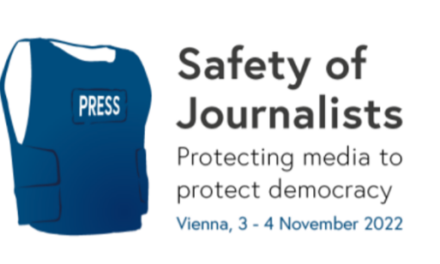Sunday 3rd May was the World Press Freedom Day 2009, and journalists in Britain chose a very special way to celebrate their “independence”. While Bastille Day or the 4th of July are all fireworks, representatives of the media preferred to acknowledge their freedom by scrutinizing, criticizing, and even mourning the near death of the freedom of the press in times of war.
Indeed the journalists, including several leading media figures, who gathered at the Frontline club for the World Press Freedom Day 2009 UK Debate voted by 38 votes to 15 (with 9 abstentions) in favour of a motion stating that “Governments at war are winning the battle of controlling the international media”.
While such an alarming statement may seem to echo dark times of dictatorship, it actually illustrated the participants’ deep concern with the way journalists are treated today.
The high number of journalists’ and media workers’ deaths, as well as the increasing role of customs such as “imbeds” and government-run Media Centgres in war zones have raised questions about journalists’ ability to report freely and fairly on conflicts.
Andrew Gilligan, the former BBC reporter who famously challenged the UK government’s case for entering the Iraq war by claiming that the claims that Iraq possessed WMD (weapons of mass destruction) were “sexed up”, soke in favour of the motion. He pointed at the almost exclusive use of imbedded journalists in Afghanistan and the “seller’s market in news” created by wars. Gilligan is now a columnist for the Evening Standard.
“You have a huge number of journalists sent out at enormous expenses to a combat zone. They have to produce something to justify their existence, and at the same time that the demand for news vastly increases, the supply for reliable news diminishes. It is a natural consequence of war, first because war is extremely confusing. [This] allows governments an extraordinary scope to manipulate the news”, he explained.
Jamie Shea, who worked as NATO’s chief spokesman during Nato’s air campaign against Serbia in the 1999 Kosovo war, lined up with Gilligan to support the motion. He offered illuminating insights into the functioning of military Media Operation during war time.
“Today, the media aspect of an operation is taken as seriously as the operation itself. The Media Operation Centre, staffed by 60 or 70 press professionals, is now a reality of all modern governments operations. [Their aim is] to keep journalists busy and focused on our stories, feed them with constant briefings. That means they don’t have much time between briefings to go off and find the facts for themselves”, he said.
The other side of the debate, championed by Jeremy Dear, General Secretary of the NUJ and Alan Fisher, an Al Jazeera English correspondent with experience of covering many conflicts, agreed that governments go to great lengths to try to win the battle to control the output of the media, but they denied that the cause was lost.
They attributed a central role to new technologies – mobile phones, Twitters and tweets — in helping journalists to overcome the spin doctors’ tricks, but their arguments failed to convince the majority of those in the audience.
“Everyone is talking about those new technologies and blogging, but if you go in the deep of the Congolese forest you will not be able to use your mobile phone. We are happy here in the UK that we can buy our simcards everywhere, but in most countries you must give all your details. People are not free to use all the technology that we’ve got and there are no bloggers”, points out Norbert Mbu-Mputu, a Congolese writer in exile and former UN worker.
Jo Collin of the Tavistok Institute also challenged the idea that new technologies have magically democratized information. “I just finished a research study for the European Commission on the use of Web 2.0 technologies, particularly in citizen journalism, and it showed that the blogosphere is a very small constituency. It tends to talk to itself”.
Indeed, in Afghanistan, the Democratic Republic of Congo or Sri Lanka, three countries where some of the bloodiest wars are currently waged, most villages do not have access to electricity, let alone the internet. Old fashioned journalism via newspapers or radio stations are the only medium of information for the population.
Moreover, the local media’s stories from such places never reach a global audience, as Western media rarely use their accounts of events because they ‘lacked the credibility of western journalists’, says Annabel Symington, the winner of the UNESCO journalism competition 2009. This allows governments to muzzle local journalists. Or even kill them.
This is indeed a paradox. The journalism 2.0 trend encourages journalists to report more locally and share their personal experiences or points of view, sometimes subjectively. But when local journalists file professional reports on conflicts in their own areas, they can find they are dismissed as “unreliable”.
In a globalised world, where governments can use those new technologies and techniques to their own advantage, as in Sri Lanka, journalists would benefit much by being more supportive of one another.
A number of speakers stressed that journalists need more public support because journalism is about preserving democracy. Jamie Shea, who is now head of Nato policy planning, argued that journalists should invest more resources and effort to “keep governments on their toes”. That, he said, is more important than looking for scoops.
The debate was organized by the UK National Commission for UNESCO and chaired by William Horsley, international director of the Centre for Freedom of the Media. Speakers included Dr Jamie Shea, Director of Policy Planning in the Private Office of the Secretary General (NATO), Andrew Gilligan, Evening Standard columnist, Alan Fisher, London correspondent for Al Jazeera English, and Jeremy Dear, General Secretary of the NUJ.
Melanie Gouby is a freelance journalist collaborating with the Institute for War and Peace Reporting on the Democratic Republic of Congo and the Central African Republic and a post‐graduate student in International Journalism at City University.




